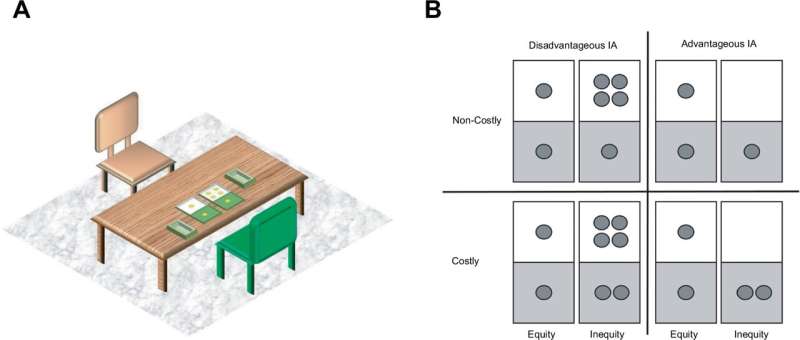How do young children perceive what is fair and what is unfair, and how do they behave as a result? Three psychologists from Heinrich Heine University Düsseldorf (HHU), Tilburg University in the Netherlands and the University of Veterinary Medicine, Vienna, show in the journal Communications Psychology that stereotypical gender differences do exist, but that the story is in fact more complicated than that.
The scenario is familiar: Seven-year-old Lukas complains loudly when his friend Henry is allowed one more scoop of ice cream than him. Although—or even because (?)—he feels unfairly treated, he refuses to share his ice cream with his friend Leo, who has none at all. By contrast, Lisa shares her ice cream with Leo. The next day, however, Lukas has chocolate with him, which he happily shares with Lisa.
The first example seems to fit the stereotype: Boys recognize exactly when they are being disadvantaged, yet at the same time they treat other children just as unfairly. Conversely, girls are more willing to share. But this stereotype does not apply in the case of the chocolate.
Three researchers, who originally all worked at HHU, have examined in more detail how this sense of fairness and unfairness develops in children: Professor Dr. Tobias Kalenscher, Principal Investigator of the Comparative Psychology research team in Düsseldorf, Dr. Lina Oberließen, now at the Wolf Science Center of the University of Veterinary Medicine, Vienna, and Professor Dr. Marijn van Wingerden from the Department of Cognitive Science and Artificial Intelligence at Tilburg University. They describe behavioral experiments they have conducted with 332 children aged between three and eight.
Professor van Wingerden says, “We did not have ice cream or chocolate though. Instead, the children were paired up and had to award each other smiley stickers. In some cases, we also added additional costs for the allocating child when they e.g. distributed the stickers equally. And then we observed how the children behaved in various gender constellations.”
Dr. Oberließen comments on the results, saying, “We indeed found gender-related effects. Girls showed more compassion than boys. Interestingly however, both genders displayed the same envy when a boy received a larger portion. This suggests that boys in general were treated with higher envy.”
Boys also tend to be more spiteful to other boys: They always selected the maximum possible number of stickers for themselves, even if it meant that their partner was left empty-handed.
So, the fairness attitudes of children are in fact dependent on gender—however, not only on their own gender, but also on the gender of the children they are interacting with.
Van Wingerden says, “We identified typical gender stereotypes—girls are more compassionate, while boys are more competitive.”
Oberließen adds, “The story is however more complicated than that. Both genders tend to treat boys with more envy than girls. And boys are significantly more compassionate when it comes to sharing resources with girls than with other boys.”
From the results, Professor Kalenscher concludes, “Gender stereotypes permeate today’s society. Our study underlines that gendered differences in social behavior can in fact be observed empirically, even in young children, possibly contributing to cultural gender typecasts in adult life.
“However, we can also see that, at least in the field of fairness preferences, gendered differences solidify over an extended period. This observation leaves room for promoting non-gender-stereotyped fairness attitudes during this critical period of childhood.”
More information:
Marijn van Wingerden et al, Egalitarian preferences in young children depend on the genders of the interacting partners, Communications Psychology (2024). DOI: 10.1038/s44271-024-00139-9
Provided by
Heinrich Heine University Düsseldorf
Citation:
Study finds gender influences fairness attitudes in children (2024, October 7)
retrieved 7 October 2024
from https://phys.org/news/2024-10-gender-fairness-attitudes-children.html
This document is subject to copyright. Apart from any fair dealing for the purpose of private study or research, no
part may be reproduced without the written permission. The content is provided for information purposes only.

